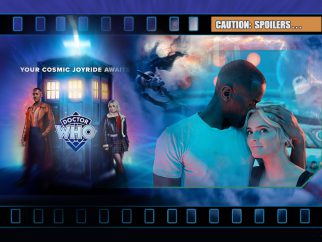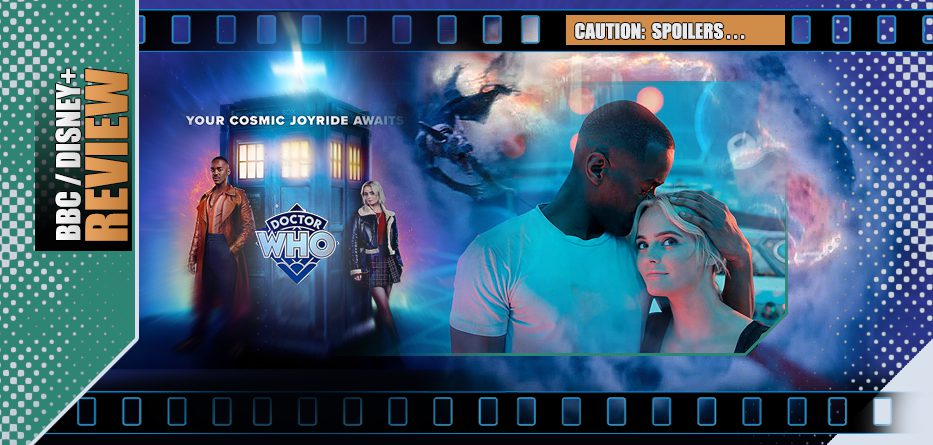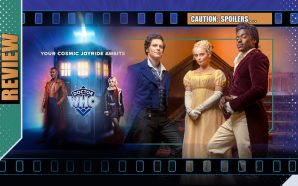The Doctor stands defeated as the world and then the cosmos falls to the sand-riddled victory of the ancient power of Sutekh. But despite life being blown away, one thing that cannot be destroyed is memory and the Doctor makes a last-ditch effort to find out why he and Ruby appear to have been spared. Is it because of the answers that may lie on a snowy night back in 2004 to Ruby’s mysterious birth…or not?
*spoilers*
Well, as it happens… mostly, not.
Doctor Who has a history for being simultaneously silly and clever, satisfying and frustrating. In a show that’s genetically-designed to appeal to a large, diverse audience – and with over six decades of adventures in time and space – we should perhaps expect nothing less from both in a season finale. Empire of Death is not so much a climax as a mosaic of mythological memories, a cosmic smorgasbord pinned to a writers’ room dartboard – all delivered on a scale one might have more expected to see in the recent sixtieth anniversary. It is a whirlwind of momentary fun, a pondering on the connections we make and the power they can have, but also something of a narrative collision between competing off-ramps. In other words, it’s pretty much a mess, though not one without some highlights.
There’s plenty of reasons to draw a comparison with Davies’ first tenure, back in the ‘Before Times’ of 2005 and much of this Disney+ debut season has been aimed to prove that the series can pivot, twist and turn and stretch to varying degrees to accommodate a new generation. But for this run, it’s almost as if Davies has memorised every ingredient needed with aplomb, but then applied them to spinning plates in random quantities… sometimes too spicy, sometimes too bland. He has form here… it’s often been a complaint that both he and Steven Moffatt have a tendency to have big ideas that don’t always have equal attention to detail or final result. Things that aren’t initially very important – harking back to several of the previous episodes- suddenly get revealed as key factors (which is quite clever!) but then things that were clearly important are handwaved away as inconvenient truths (which is quite frustrating). It’s a wide, vivid but inconsistent canvas and therefore hard to evaluate as a whole. Thus, as it ever was.
We land quickly, with Sutekh reaching out with his sand-storms and killing everything and everyone it touches. Uh-oh, there go Kate Stewart, Rose, Morris, UNIT soldiers, Ruby’s family, all reduced to grains of dust-to-dust. (Presumably, somewhere off-camera, Tennant’s Doctor and Donna suffer similar fates which is really the only way to explain their lack of tangential involvement given that Rose Noble is there). Take, that Thanos! The problem with killing off so many supporting players so quickly is that any initial ‘OMG! Did they really do that?‘ unease or feeling of any real consequence is dispelled with the realisation that the sheer scale of it all means some sort of giant red reset button is obviously going to be needed – yet again – to resurrect everyone. It’s likely one that’s going to have its big puzzle explained with a line of dialogue equivalent to ‘with a bound he was free‘ logic. But before that moment it’s a race through time and space as the Doctor and Mel, reunited with Ruby, realise they can use the ‘Memory Tardis’ from the Time Window to get off-world and try to find a weakness in Sutekh’s plans. (Again, no-one thinks that Tennant’s Tardis is also around – but was that infected with Sutekh too…. oh, bi-generational logic fall-out, how you vex me!).
For the rest of the main parts of the episode, we’re running and fretting, glancing back over previous episodes for some references (for instance, the Tardis perception filter is… drum-roll… 73 yards!). Yet, tellingly, the most powerful scene here is a seemingly incidental one with a one-off character – and the kind of emotional moment that Russell T Davies tends to write well when he doesn’t have one eye on timey-whimey pop-culture, so it’s a shame there’s less of it here. We see a nondescript planet where the Doctor encounters a lone survivor, a young woman (played by Fleabag‘s Sian Clifford) who’s trying to come to terms with her scale of loss. She’s seen her world destroyed, her memories fractured and is trying to understand the scope of all that in the presence of the Doctor, a visiting stranger. In the midst of the realisation she’s lost her own child and is going to die soon herself (a reaction to Sutekh’s ‘death wave’ that is passed retroactively from child to parent – a truly chilling idea) she offers the Doctor… a spoon. It’s an abstract gift that will have some import later, but like that Luke Skywalker moment when he quietly gazes at Tattooine’s setting suns and silently thinks ‘Anywhere but here…‘ it’s the calm, very human and under-played beat before the literal storm and a wonderfully-judged oasis in all the less well-judged chaos.
Sutekh is an impressive villain in the megalomaniacal pantheon of foes, voiced again by the suitably-named Gabriel Woolf, but the CGI used to create him this time makes him curiously generic and might have been better if confined to enhancements for physical props. At times he’s very much the literal collection of swirling, snarling post-production pixels, less like a genuine god and more a full-on Scooby-Doo‘d acid-trip. And, for a ‘god’ he’s really just seen posturing around and ordering others to procure wholesale sandy death for him. This is one of Who‘s most infamous foes… but it doesn’t really feel that way. For all the status, he’s ultimately thwarted like a middle-management minion, literally ‘leashed’ and taken for extraterrestrial ‘walkies’ dragged through the Time Vortex in the wake of the Tardis. Not only does this feel more akin to a cartoon showdown, it’s also used as RTD’s reset button: Sutekh’s collisions with the Time Vortex conveniently restoring everything to life (hello, Miracle Day?) with a nonsensical ‘Death killing death brings life!‘ decree and before the Doctor finally cuts ties. This is an evil force that’s been lurking around the Tardis interior since 1911, learning its secrets and surviving a whole cycle of apocalypses, destructions and duplications and this is the best dog-face can do? As visuals go it’s fine, but narratively it’s all rather silly and uninspired. I’d really like to have seen the Doctor defeat him through genuine smarts rather than a ‘Aha! I just distracted you so my assistant can put a collar on you!’ deception with convenient gadgets and VFX quips. Is this really the end of the Sutekh menace – it wasn’t last time, but it did take fifty years to come back.
Despite some nice genuine moments and a cast that generally tried their best, it’s hard not to feel disappointed in The Empire of Death, if only because Davies set up so much and generated much renewed interest in the show from both die-hard fans and casual viewers alike… but ultimately delivered little more than ‘moments’ that had the potential to soar, but then rushed the landing… I suspect the season was made to (and has done enough to) establish the show’s bonafides and firm placement in the Disney+ firmament and has been a glimpse into the wide-range of possibilities the show can offer going forward… but the 2024 offerings still feel like a skeletal showreel of the basics, a miscellany of mission statements and scattershot efforts…
Who is Susan Twist’s recurring character(s)? I’m still not sure, despite the explanation that she is both a series of real people and yet Sutekh’s harbinger imprint created wherever the Doctor has been… and we’re left with one version being the latest of many recruits to UNIT (incoming spin-off, right?). It’s another of those ‘don’t think too hard about how that worked‘ elements.
The identity of Ruby’s mother is the other big column of the series and apparently resolved with RTD going down the ‘Rey/Star Wars’ route of building Ruby and her lineage something worthy of scrutiny and then making her…. well, no-one of any innate cosmic importance, Ruby’s mother only been given power by the myth of who she might have been (thus acting as a meta-commentary for the show – where even the Gods are confused and speculating!). No, Louise Miller (Faye McKeever) was simply an overburdened teenage mother in a bad relationship and one who always regretted leaving her child but felt too ashamed to find her. We meet her again, as does Ruby, and despite the Doctor’s concerns, Ruby reveals her identity and reconciles. It’s all rather, well…pleasant but ordinary in its ‘revelations’, which RTD insists makes it special as well. So, despite all the groundwork, pay no attention to mom’s mysterious cloaked-presence in the past, her strangely-always-unseen face, the fact that Maestro insisted that there was something ‘Very wrong’ with Ruby, chronological VHS-glitches, her glib acceptance that her daughter now travels in time and space and her own spectral pointing – the latter of which is explained by her choosing her child’s name from a signpost even though there was no-one around to register it? Whatevs. Subverting expectations is one thing, but insisting on the thrill of mystery and then explaining there is no mystery are problematic decisions. Viewers want a pay-off for their investment.
The Doctor and Ruby’s final scene together plays the full emotional orchestra with Gatwa and Gibson delivering the goods on an acting level, but – honestly – the real problem here is that it simply hasn’t been earned. Previous characters like Clara, Rose and Donna had a slow-burn relationship with their fellow traveller and we hurt alongside them and valued their bond and sacrifices as they exited. Yet Ruby and the Doctor have only played to the window-front bullet-points, dangerously close to being a tribute act in search of an epic, their perceived bond a matter of reading out a few lines of needed script rather than feeling organic, logic or chronological despite the actors’ best efforts. They were supposed to have been bonded by the mysteries surrounding their origins, ‘orphans’ in reflective ways…but even then, it’s hardly been mentioned. And, more tellingly, we’ve had only nine stories to observe the chemistry between them, so while it exists, it’s been impossible to watch it evolve organically and sometimes feeling like we’re even watching episodes out of order. What makes matters worse is that Gatwa’s hardly been in a quarter of those episodes (I get his contractual commitments to Sex Education but, really, it’s inexcusably crippling for a debut run) and Gibson only lightly featured in some. Have there been more adventures between the episodes to build it on – sure, let’s go with that – but it becomes lip-service to observed growth, like a montage of photos from a lifetime of distantly-glimpsed birthdays rather than living the years. At the end the Doctor says Ruby’s profoundly changed his life… (…you, Ruby Sunday, I will see again, because you changed me. You made my life bigger and better.) Really? Anyone with a passing knowledge of Doctor Who likely shrugged and thought ‘Okay, she’s fine, but did she really break into the Top Ten of Tardis Influencers?‘ The whole ‘your real life is just beginning’ talk felt like rushed punctuation and a designated story-arc being ended and though I like Gibson and I’m glad we will see more of her next season, it does feel like at the time of writing the script, that there could have been some indecision as to whether she’d be back after so much was seemingly quickly tied up in a domestic bow. Is there more to tell of the story… one hopes so.
And what of Anita Dobson’s Mrs. Flood and her continued sinister asides straight to camera? No real answers there, yet either – she had/has her own unconnected plans (temporarily thwarted by Sutekh until the reset) and certainly thinks she knows of the Doctor’s history and future, but despite fan speculation that she’s connected to Professor Song (River/Flood, geddit?), Susan Foreman (surely something to come next year in that regard, right?) or maybe even the Master/Missy, there’s really nothing to definitively indicate her identity. (Though it’s fun to note that she’s been seen in clothes reminiscent of the distinctive wardrobe of Clara and Romana – but just RTD messing with us, surely?).
Despite some nice genuine moments and a cast that generally tried their best, it’s hard not to feel disappointed in The Empire of Death, if only because Davies set up so much and generated much renewed interest in the show from both die-hard fans and casual viewers alike… but ultimately delivered little more than ‘moments’ that had the potential to soar, but then rushed the landing. I suspect the season was made to (and has done enough to) establish the show’s bonafides and firm placement in the Disney+ firmament and has been a glimpse into the wide-range of possibilities the show can offer going forward… but the 2024 offerings still feel like a skeletal showreel of the basics, a miscellany of mission statements and scattershot efforts rather than a full-on series proper. Who‘s generational shifts and event horizons can’t be avoided and there will be those of us feeling a little left behind, but while fans can be fickle at times and even toxic in their takedowns, it’s the production itself that now has to shoulder the responsibility of deciding if this has been a springboard forward to better things or whether it is just playing to the basics, treading water in a slightly more sparkly pool of pop culture of budgets and bully-pulpits.
I’m still going to be watching and applauding what it gets right, there’s something about the show that always seems to fill a televisual void … though I think I may have to accept that the Doctor now belongs to others, which is perhaps exactly what the evolving prescription should be.

- Story6
- Acting8
- Direction7
- Production Design / VFX8











